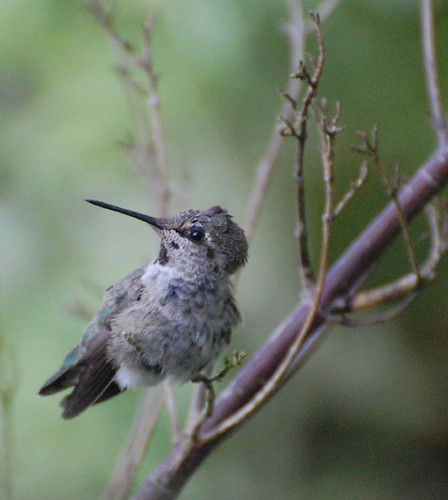Last week, my little campsite seemed to be located in the middle of an “Ax Men” set. (Much of the footage for this reality show is shot around these very parts.) Every morning, as I sat outside with my coffee watching the birds, a parade in celebration of the logging trade took place up and down Highway 47. Empty log trucks flew past from the north, and trucks laden with piles of fresh logs chugged up from the south. The logs were headed, I believe, for the port at Longview, where they are then shipped to the Far East. In their raw state. So we send both our logs AND our jobs to China and Japan. A pretty crappy deal, really.
Judging by the volume of logging traffic I witnessed during my week in the woods, it would seem the logging trade is enjoying some good times. And the once tree-covered hills of Columbia and Clatsop Counties bear the clear-cut scars to prove it.
Sure, there are a lot of trees around here. And there are still more trees than naked hillsides, in most places. But these are not old growth trees. There are precious few old growth forests left; had they not been fiercely protected by the “tree-huggers,” there would not be any, I’m sure of it. When I drive up into the wild hills of our county, I am astonished at the width and breadth of the forest. The little roads wind and climb and twist, and sometimes you break out into the open on top of a ridge and all you can see for miles in any direction are tree-covered hills. It’s breathtaking.
But as you catch your breath, you realize your immediate surroundings look like a battlefield. The tallest features are bleached stumps of trees, and the other vegetation, this time of year, is parched and brown and desolate. You have topped a clear-cut ridge; this is why you have such an astonishing view of those miles and miles of forested hills. This one is supposed to be forested, too. But it’s not. So while the view is gorgeous, for me, the air is heavy with melancholy. I can feel the sadness of the earth…the mourning for what was once here, what should still be here.
Years ago, when I was a child, my family used to vacation in central Wisconsin. We had a favorite park where we frequently camped, and we explored the back roads—the little county roads that were designated by letters: “County Trunk D” or “County G.” Those roads rambled through fields and forests of stunted pines. I’d like to say it was a lovely break from our suburban Chicago environs; but there always seemed to be a pall of sadness over that area. I thought at the time that it was the obviously depressed economy of the region that gave off those strong vibrations of misery. This entire area had been logged; the logging companies had cut down all the trees that were economically feasible to harvest, slapped new seedlings in the ground as a shoddy homage to reforestation, and moved on. Took their boom—their logging operations, their mills, the entire economy that surrounded them—and moved on.
But though the streets of the little towns were lined with shuttered businesses, and the country homesteads looked unkempt and squalid, I realize now it was not the people from whom that pervasive melancholy was emanating. It was the land. The Earth herself was mourning. Mourning for the trees.
I get that our little county is desperately broke. Our unemployment rate here is 11.9%--well above the state average of 8.9%. There are not a lot of people here, but those who are here and who have been here for generations have been highly dependent upon logging and mills for employment. The Boise Cascade Mill in St. Helens closed last year, costing the county between 400 and 500 living wage union jobs. A large portion of our tiny county budget comes from a Federal program—the Secure Rural Schools Act —which funnels money to timber-dependent states. This legislation has been on the chopping block for at least the last five years, and gets re-instated at the last minute in one-year increments at progressively lower levels of funding. Which means that our county is basically being water-boarded by the high jinks in Washington: Just when we are on the brink of asphyxiation, they pull off the rag and we can breathe…for a few more months.
So I know it’s tantamount to treason for me to loathe the practice of cutting down the forests. But my spirit simply cannot acquiesce to it. And, in the end, those truckloads of murdered trees are not even providing the life blood to this county that they should be. Sure, the loggers are working… And the truckers, and the longshoremen. But WHY is this precious material going elsewhere to be processed? Why have all our mills closed down? Why are the Lumber Barons allowed to devastate our natural lands and then send the jobs overseas so they can line their pockets with more profits?
And what if the lumber and its jobs were remaining in this country? Would that somehow justify the carnage? I don’t know. I have serious doubts about a society that has kicked thousands of families out of perfectly good homes that now stand empty (owned by banks who will now attempt to sit on them like some kind of soured asset until they regain enough of their lost value to become once again piles of “funny money” accepted as currency in a corrupt marketplace); which then, inexplicably, uses the building of MORE homes as a leading indicator of the strength of its economic recovery. Why the hell are we building homes when there are perfectly good ones padlocked and empty in nearly every neighborhood across the country? Can’t we just leave the trees alone for now?
And here’s an interesting coda to all this: Over the past several months, our area has been presented with opportunities to gain jobs by jumping on the export bandwagon. There have been proposals to allow the piping of liquid natural gas, and trainloads of coal to pass through our county on the way to the export market. The hue and cry against allowing these “polluting!” industries to get any kind of foothold in the area has been loud and strident. I can’t help but shake my head and wonder at the blatant hypocrisy of my suddenly environmentally responsible neighbors, who would have no problem whatsoever leveling every tree in sight if it meant one stinking job would remain in the county, but cry “Ew! No! Dirty!!!” when an alternative—and no less destructive—proposal to create jobs is put before them. They don’t really have problems with destroying the environment…they just want to do it in their own, comfortable, familiar way.
If there’s an answer to all this, it’s not a simple one that can be described in a sound byte or mapped out by a legislative culture that could not even agree that the sun will rise tomorrow without derisive partisan bickering. All I know is, we need to stop cutting down the forests. We need to stop plunging daggers into the breast of Mother Earth and believing she doesn’t feel it. Right now, she mourns…she weeps. She fills the air with sadness and melancholy, as she has for hundreds of years, while we have degraded, debased and denuded her for our own gain. And we ignore her.
We had best hope that she doesn’t, in time, become really angry. Because I’m afraid the human race would not survive her wrath.
Subscribe to:
Post Comments (Atom)




















In the collection we got for dad over the years there's one about that part of the country. They Tried to Cut it All. They not only tried, they succeeded. Couldn't get the cut out fast enough. And Weyerhauser was one of the main culprits.
ReplyDeleteWe're cutting more now than we ever have, trouble is they can get out the cut with fewer workers. I'd love to see log exports banned. You cut it here, you mill it here. Colonies ship out raw materials.